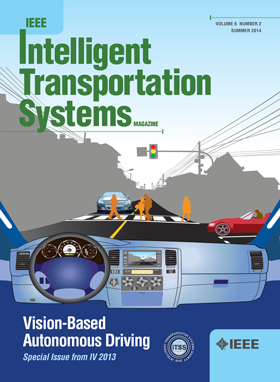Cooperative Merging in Mixed Traffic: A Mobile-Edge Hybrid Control Framework
IF 7.9
1区 工程技术
Q1 ENGINEERING, CIVIL
IEEE Transactions on Intelligent Transportation Systems
Pub Date : 2025-02-17
DOI:10.1109/TITS.2025.3540136
引用次数: 0
Abstract
This paper addresses decision-making challenges in mixed traffic environments comprising both conventional human-operated vehicles (HVs) and connected automated vehicles (CAVs). Our proposed framework is exemplified using a ramp merging scenario and is structured as an optimization problem, in which a merge sequencing problem and a trajectory planning problem are embedded and solved by a bi-level hybrid centralized-decentralized model predictive control (HMPC) approach. The HMPC framework we introduce leverages centralized edge computing for efficient merge decision optimization through a dynamic-programming approach and decentralized mobile computing for distributed trajectory planning through three different optimization algorithms. Simulation results show that compared to open-loop control, the proposed framework can ensure system efficient ramp-merging control, and exhibits robustness in the presence of uncertainty caused by the stochastic driving behaviors of HVs. In addition, it is found that mobile-edge hybrid framework can reduce the computational time to the millisecond-level, potentially meeting real-time computational requirements.混合交通中的协同合并:一种移动边缘混合控制框架
本文研究了混合交通环境下的决策挑战,包括传统的人工驾驶车辆(HVs)和联网自动驾驶车辆(cav)。我们提出的框架以匝道合并场景为例,并被结构为一个优化问题,其中嵌入了合并排序问题和轨迹规划问题,并通过双层混合集中式-分散式模型预测控制(HMPC)方法解决。我们介绍的HMPC框架通过动态规划方法利用集中式边缘计算进行有效的合并决策优化,并通过三种不同的优化算法利用分散的移动计算进行分布式轨迹规划。仿真结果表明,与开环控制相比,所提出的框架能够保证系统有效的匝道合并控制,并且在HVs随机驾驶行为引起的不确定性存在下具有鲁棒性。此外,发现移动边缘混合框架可以将计算时间降低到毫秒级,潜在地满足实时计算需求。
本文章由计算机程序翻译,如有差异,请以英文原文为准。
求助全文
约1分钟内获得全文
求助全文
来源期刊

IEEE Transactions on Intelligent Transportation Systems
工程技术-工程:电子与电气
CiteScore
14.80
自引率
12.90%
发文量
1872
审稿时长
7.5 months
期刊介绍:
The theoretical, experimental and operational aspects of electrical and electronics engineering and information technologies as applied to Intelligent Transportation Systems (ITS). Intelligent Transportation Systems are defined as those systems utilizing synergistic technologies and systems engineering concepts to develop and improve transportation systems of all kinds. The scope of this interdisciplinary activity includes the promotion, consolidation and coordination of ITS technical activities among IEEE entities, and providing a focus for cooperative activities, both internally and externally.
 求助内容:
求助内容: 应助结果提醒方式:
应助结果提醒方式:


